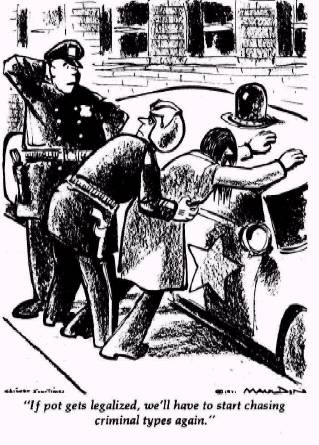 The Inalienable Rights Enforcement Initiative is an initiative that could end up in the November'08 ballot in California. It calls for legalizing the growth, sale, and possession of marijuana, collecting taxes on its through a system of stamps and licenses.
The Inalienable Rights Enforcement Initiative is an initiative that could end up in the November'08 ballot in California. It calls for legalizing the growth, sale, and possession of marijuana, collecting taxes on its through a system of stamps and licenses.
Here is the proposition to end the prohibition:
An initiative to safeguard the inalienable rights of the people providing for the legalization, regulation, and taxation of marijuana, to finance the costs of drug treatment, invest in job training and new jobs, and give money to be spent at the local level.
This initiative will amend the Constitution of California to defend and safeguard the inalienable rights of the People against infringement by governments and corporations, providing for the lawful growth, sale, and possession of marijuana. Marijuana will be taxed through a system of stamps and licenses--a $5 stamp will be required for the sale of an eighth ounce of marijuana and a $50 annual license will be required for the growth of one marijuana plant. To protect participants and encourage participation in the system, such licenses and stamps will be available anonymously in stores where marijuana is sold. Valid possession of such a license or stamp will entitle possessors to protection against infringement of their inalienable rights by governments and corporations with respect to the lawful growth, sale, or possession of marijuana. This system will be financed by 10% of the revenues generated by the sale of stamps and licenses. The remaining 90% of revenues will be divided equally-30% to finance the costs of drug treatment, 30% to invest in job training and new jobs, and 30% to be spent at the local level. Any excess shall be redistributed equally among the People, except those in a household making more than five times the median salary.
The Declaration Of Independence From Marijuana Prohibition:
When, in the course of human events, it becomes necessary for the People to assume the power to throw off a harmful and unconstitutional exercise of power by the federal government, and to provide new laws designed to promote, defend, and safeguard their inalienable rights and best interests, a decent respect to the opinions of humankind requires that they should declare their reasons.
We hold these truths to be self-evident--That all people are by nature equal, with inalienable rights, including the rights to life, liberty, reasonable privacy, reasonable property, and a fair opportunity to learn, prosper, and be reasonably happy, healthy, safe, and secure--That the powers and privileges of governments and corporations are granted by the People and are limited to promoting, defending, and safeguarding the inalienable rights and pursuing the best interests of the People--That whenever these powers or privileges become destructive of the rights and best interests of the People, the People have the power to alter or to abolish the power or privilege, and to take the steps necessary and proper to promote, defend, and safeguard their inalienable rights and best interests against government or corporate infringement.
We also hold these truths to be self-evident-That, as an intoxicant, marijuana is far less harmful to the health and safety of the People than alcohol--That, as a smoking substance, marijuana is far less addictive or harmful to the health of the People than tobacco--That, even though alcohol
is harmful to the health and safety of the People, the prohibition of alcohol from 1920 to 1933 only increased the harms associated with alcohol use: criminals seized control of the alcohol market, crime and violence increased greatly, and poverty, unemployment, and corruption flourished, while otherwise lawful alcohol drinkers were treated as "criminals" subject to detention, arrest, and incarceration, even though they had not harmed the rights of anyone-- That, as with alcohol prohibition, the prohibition of marijuana has only increased the harms associated with the use of marijuana: criminals control a multi-billion dollar market, crime and violence have increased greatly, and poverty, unemployment, and corruption flourish, while otherwise law-abiding marijuana smokers are treated as "criminals" subject to detention, arrest, and incarceration, even though they have not harmed the rights of anyone-That the history of marijuana prohibition is a history of repeated injuries and infringements upon the inalienable rights, powers, and best interests of the People.
 Despite the harms of marijuana prohibition, politicians persist in imposing and upholding marijuana prohibition, because these politicians are not working for the People--they are working for the corporate executives who financed their campaigns, such as corporate executives in the alcohol industry who want to protect their monopoly on intoxication, corporate executives in the tobacco industry who want to protect their monopoly on smoking, corporate executives in the pharmaceutical industry who want to protect their monopoly on expensive medicines, and corporate executives in the many industries threatened by competition with hemp. These corporate executives pull the strings of the government to perpetuate marijuana prohibition despite its harms, because they do not care about the inalienable rights and best interests of the People--they care about taking as much money from the People as possible. These corporate executives also use their control of the mainstream media to make it seem like marijuana prohibition is a failed attempt to serve the interests of the People, censoring the idea that marijuana prohibition is a successful attempt to serve corporate interests at the expense of the People. For these corporate interests, politicians sacrifice the inalienable rights and best interests of the People. This corruption and corporate influence is worse at the national level, where the People can least afford political influence and the media is most effective at manipulating public debate. Because of this corruption, it is futile for the People to turn to the federal government for protection--because the federal government is the source of the harm. The repeated attempts by the People to reduce the harms of marijuana prohibition have been answered only by repeated injury. The harm from marijuana prohibition is ongoing and the need for relief is urgent. Such is the suffering of the People, and such is the necessity that constrains us to alter our former systems of government. A government with a character marked by every act that defines a tyrant is unfit to be the ruler of a free people. Therefore, appealing to humankind for the rightness of our intentions--
Despite the harms of marijuana prohibition, politicians persist in imposing and upholding marijuana prohibition, because these politicians are not working for the People--they are working for the corporate executives who financed their campaigns, such as corporate executives in the alcohol industry who want to protect their monopoly on intoxication, corporate executives in the tobacco industry who want to protect their monopoly on smoking, corporate executives in the pharmaceutical industry who want to protect their monopoly on expensive medicines, and corporate executives in the many industries threatened by competition with hemp. These corporate executives pull the strings of the government to perpetuate marijuana prohibition despite its harms, because they do not care about the inalienable rights and best interests of the People--they care about taking as much money from the People as possible. These corporate executives also use their control of the mainstream media to make it seem like marijuana prohibition is a failed attempt to serve the interests of the People, censoring the idea that marijuana prohibition is a successful attempt to serve corporate interests at the expense of the People. For these corporate interests, politicians sacrifice the inalienable rights and best interests of the People. This corruption and corporate influence is worse at the national level, where the People can least afford political influence and the media is most effective at manipulating public debate. Because of this corruption, it is futile for the People to turn to the federal government for protection--because the federal government is the source of the harm. The repeated attempts by the People to reduce the harms of marijuana prohibition have been answered only by repeated injury. The harm from marijuana prohibition is ongoing and the need for relief is urgent. Such is the suffering of the People, and such is the necessity that constrains us to alter our former systems of government. A government with a character marked by every act that defines a tyrant is unfit to be the ruler of a free people. Therefore, appealing to humankind for the rightness of our intentions--
We, the People, do hereby solemnly publish and declare that we are and of right ought to be free and independent from the prohibition of marijuana, free to provide for the lawful growth, sale, and possession of marijuana, free from any power or privilege that unreasonably infringes upon our inalienable rights, and free to take the steps and exercise the powers necessary and proper to safeguard our inalienable rights and best interests against government or corporate infringement.
Via: Laist. See the full text of the initiative, or visit NORML.org.